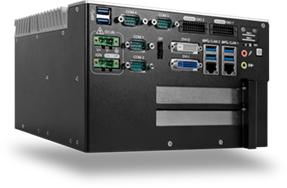Success in the industrial sector is often determined by who embraces innovation first. Henry Ford developed the modern assembly line and changed industrial processes forever. Eli Whitney invented the cotton gin and made mass-produced cotton garments feasible. Today, innovation comes from integrating modern industrial-grade computers into daily operations.
By implementing industrial panel PCs and tablets, businesses can reap a wide range of benefits, from more efficient processes to safer workplaces and better control over their supply chains.
Industrial Computers: Use Cases and Their Benefits
There's virtually nowhere in the industrial sector that industrial computers can't make improvements. What follows are just some of the areas that become safer, more efficient, or more flexible with computer support.
Manufacturing and Automation
Industrial computers are key to implementing "smart" factories, where equipment and machines are linked via digital technology for more accessible communication and control. Sensors can gather data from machinery on factors like the number of units produced, the rate of production, and the machine's heat, then transmit that data to the computer for analysis. This helps manufacturers identify issues such as production bottlenecks and equipment failure early on rather than let them snowball into a larger issue.
Automation, where human workers are replaced by automated machinery, is also enabled via industrial computers. Mini rugged PCs, which are small enough to be integrated into almost any machine or assembly line, can serve as data collection, control cards, and error detectors, sparing human workers from having to fulfill those roles.
CNC (computer numerical control) machines are a great example of automation at work; using industrial computers as their "brains," they can work independently of any worker as they drill, cut, or shape materials as needed, following their preprogrammed instructions every step of the way.
Asset Tracking and Logistics
Having the right materials and equipment is not enough; you must also have them in the right place at the right time. This is where RFID-tagged assets and materials become critical. These tags automatically transmit to receivers and readers, allowing industrial tablets to track their location throughout a facility.
Companies can use this to track essential equipment such as forklifts and welding machines, helping workers quickly find them rather than waste time looking for their tools. RFID tags are also extremely useful for tracking packages and goods as they're moved, automatically updating inventories and shipping manifests as they go.
Workplace Safety
Safety must be a top priority for any industrial facility, whether a factory, mine, or oil rig. Therefore, industrial computers implement and support various safety features to better protect the workers who use them. For example, industrial computers implement DIN rails, a standardized structural rail for mounting electrical equipment, preventing electrical shorts from reaching users and shocking them.
In addition to enabling automation, CNC machines equipped with industrial computers are also much safer than their manned equivalents. By performing tasks automatically and independently, workers do not need to lean over or get close to dangerous lathes, drills, or cutters.
Lastly, RFID tags and rugged industrial tablets and computers capable of tracking them can also be used to monitor employees at an industrial site. This can be a lifesaving measure in dangerous work environments where workers may have to evacuate at a moment's notice, such as a mine or oil rig. By wearing uniforms or badges with active tags, employers can know who is on the worksite and where they are located, which lets them know who needs to be evacuated should the worst occur.
Quality Control
By tracking assets on their industrial computers, manufacturers can ensure that raw materials go where they're supposed to go when they're supposed to go. This removes the human element prone to errors associated with paper records or manual data entry. RFID tags can include an item's name, SKU number, history, and even photo, ensuring that warehouse employees know precisely what they're storing and where, ensuring they don't accidentally send out the wrong materials.
Closing Thoughts
Integrating industrial-grade computers into a facility is far more impactful than upgrading to a new version of an old tool. Computer support opens up a wide range of features and applications that were previously inaccessible, expanding your business's possibilities like never before.
If you're looking for a trusted source of industrial-grade computers and tablets ready for any work environment, contact the team at Cybernet Manufacturing. Our products are designed and tested specifically for rigorous industrial settings and come loaded with features and options that make them perfect for roles on the factory floor and oil platform.
Join the conversation and connect with us on this and other relevant topics - Follow us on Facebook, Twitter, Instagram, LinkedIn, Youtube, and TikTok.


